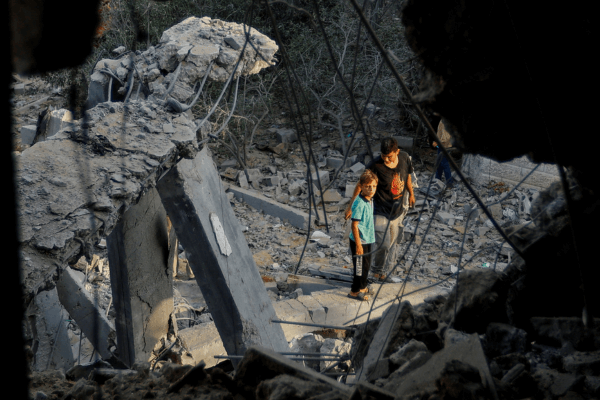
Christians around the world, including Pope Francis and the World Council of Churches, have issued statements condemning the horrific violence that erupted this weekend in Israel and Palestine.
On Saturday, Hamas militants attacked Israelis with rockets while gunmen killed people at more than 20 sites in Israel, including a dance festival, bus stops, and front lawns; the militants also seized 150 hostages. Israel responded with a declaration of war and airstrikes into the Gaza Strip. According to recent reports, more than 2,000 people in Israel and Gaza have been killed, including many civilians.
“We unequivocally condemn any acts that target civilians, regardless of their nationality, ethnicity, or faith,” said top Catholic, Orthodox, and Protestant leaders of Jerusalem churches in an Oct. 7 statement calling for an immediate end to the violence. They also urged “the international community to redouble its efforts to mediate a just and lasting peace in the Holy Land, based on equal rights for all and on international legitimacy.”
Yet other Christians around the world also called attention to the context of the Israeli-occupied Palestinian territories, especially the Gaza Strip, even as they condemned the violence and called for ceasefires and a diplomatic resolution.
A list of prayers from Sabeel Ecumenical Liberation Theology Center, a group of Palestinian Christians, lifted up all who are suffering while calling attention to history of the Israeli-occupied territories of Palestine. “May we remember that the recent events are connected to the long history of the Nakba and Israeli systematic oppression against the Palestinian people.” Nakba, which means “catastrophe” in Arabic, refers to the mass displacement of Palestinians from their homelands when Israel was established in 1948.
Palestinians living in Israel and the Occupied Palestinian Territories have been unlawfully killed, forced from their homes, and subjected to widespread discrimination under Israel’s rule that human rights experts from the United Nations, Human Rights Watch, and Amnesty International consider crimes of apartheid.
The Gaza region, a narrow strip of land that is home to more than 2 million Palestinians, has been under an Israeli and Egyptian blockade since 2007 and relies heavily on humanitarian aid. On Monday, Israel announced an intensified total siege against Gaza that would not allow any water, food, fuel, or electricity into the area.
“It’s a pressure cooker,” Kuttab told Sojourners. “And then after a while, it bursts. What we saw in the last three days was basically a major jailbreak. Where people break out of jail, trust me, they act like animals. Anybody who’s in their way, anybody who’s been keeping them in prison, anybody who’s preventing them from being free, a lot of things happen, which are awful.”
“It’s very hard because we’re always preaching nonviolence to the weak,” said Kuttab. “We’re not preaching nonviolence to Israel. We’re simply sending them more and more sophisticated weapons. If we want to talk nonviolence, we have to start by talking about Israeli militarism, then we can talk about nonviolence.”
Mitchell Atencio contributed to this reporting.

